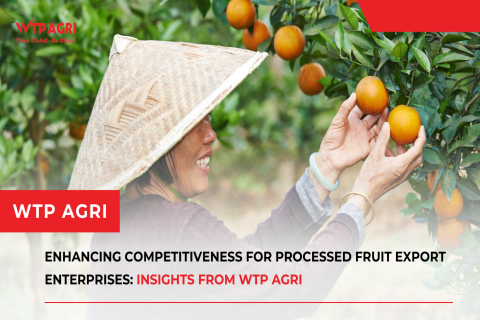The export market for processed fruit is growing rapidly and becoming increasingly competitive. For Vietnamese products to reach the world and be accepted by international consumers, meeting international quality standards is crucial. To conquer the global market, Vietnamese processed fruit exporters must comply with international quality standards, which include mandatory requirements for quality, food safety, and other factors essential for market entry.
I. Why Are International Quality Standards Important?
/36.png)
- Ensuring Food Safety: These standards set strict requirements for food safety and hygiene, protecting consumers' health and preventing food poisoning risks.
- Enhancing Reputation and Brand: Products that meet international standards are more reputable and valuable, helping businesses build strong brands and increase competitiveness.
- Expanding Export Markets: Major markets such as the US, EU, Japan, and South Korea require imported products to meet international quality standards. Complying with these standards opens up export opportunities to these potential markets.
- Increasing Product Value: Products that meet international standards often have higher selling prices, helping businesses increase profits and achieve sustainable development.
II. Important International Quality Standards
/37.png)
- GlobalGAP: This standard emphasizes sustainable agricultural production, ensuring food safety and worker welfare. Businesses must comply with requirements for farm management, pesticide use, and product harvesting and storage.
- BRC: The British Retail Consortium (BRC) standard focuses on food safety and product quality. Businesses must implement a comprehensive quality management system, including raw material control, production processes, product quality inspection, and traceability.
- IFS: The International Featured Standards (IFS) also emphasize food safety and product quality, with a focus on social and environmental responsibility. Businesses must meet requirements for food safety management, environmental management, working conditions, and employee welfare.
- HACCP: Hazard Analysis and Critical Control Points (HACCP) is a system for identifying and controlling potential hazards in the production process, ensuring food safety.
- Traceability Requirements: Traceability is crucial for building customer trust and ensuring product accountability. Businesses must have a clear and transparent traceability system that allows tracking products from cultivation, harvesting, and processing to the consumer.
- ISO Standards: The International Organization for Standardization (ISO) has issued several standards related to processed fruit, including ISO 22000 for Food Safety Management Systems, ISO 9001 for Quality Management Systems, and ISO 14001 for Environmental Management Systems.
- Import Market Standards: Each import market may have specific quality requirements for processed fruit. Businesses need to thoroughly understand these requirements before exporting products to those markets.
III. Benefits of Meeting International Standards
/12.png)
- Enhancing Customer Trust: When products meet international standards, customers have greater confidence in their quality and food safety.
- Expanding Export Markets: Businesses can export products to more markets, increasing sales and profits.
- Building Brand Reputation: Meeting international standards helps businesses build brand reputation and establish a strong market position.
- Increasing Market Access: Internationally certified products are allowed to enter many potential markets worldwide.
- Improving Competitiveness: Businesses can compete more effectively with other market players.
- Reducing Risks: Businesses minimize risks of product recalls, customer loss, and damage to brand reputation.
IV. What Businesses Need to Do to Meet International Standards
- Implement Quality Management Systems: Businesses should implement quality management systems according to ISO or other international standards. These systems help businesses tightly control all stages of production, ensuring product quality.
- Invest in Infrastructure: Businesses need to invest in infrastructure to meet the hygiene and food safety requirements of international standards.
- Enhance Employee Training: Businesses should train and enhance employee knowledge and skills in production, quality management, and food safety.
- Regularly Update Information: Businesses should regularly update information on international quality standards to ensure their products always meet the latest requirements.
Meeting international quality standards is a challenge but also a great opportunity for Vietnamese processed fruit exporters. By striving to improve product quality, Vietnamese businesses can conquer the global market and establish their position internationally.
V. Solutions from WTP Agri: Accompanying Businesses to Meet International Standards
/40.png)
WTP Agri understands the importance of international quality standards for the success of processed fruit exporters. We provide consulting, support, and training services to help businesses:
- Build and Implement Effective Quality Management Systems: Ensure products always meet international standards.
- Implement Strict Quality Control Processes: From raw material selection, processing, to packaging and storage.
- Complete Certification Documentation: Help businesses achieve international certifications quickly and smoothly.
VI. Conclusion
The global processed fruit market offers immense potential for Vietnamese businesses. However, to succeed in this market, businesses must meet strict international quality standards. This article has introduced key international quality standards, guided businesses on how to meet these standards, and analyzed the benefits of compliance.
WTP Agri is a trusted partner, ready to accompany businesses on their journey to conquer the international market. With a team of experienced experts and a professional quality management system, WTP Agri is committed to helping businesses achieve international standards efficiently and cost-effectively.
Contact WTP Agri today for free consultation and begin your journey to success

 Vietnamese
Vietnamese  Korean
Korean Japanese
Japanese Chinese
Chinese
/36.png)
/37.png)
/12.png)
/40.png)


